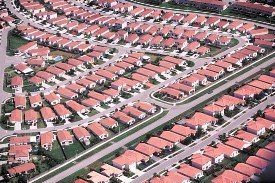Are Pandemics An Argument Against Cities?
Legal Planet: Environmental Law and Policy 2020-03-25


With the COVID-19 virus shutting down cities and countries all over the world, anti-urban advocates are seizing the moment to argue that pandemics prove urban density is bad. For example, longtime sprawl booster Joel Kotkin argues that shelter-in-place orders and fear of contagion will push people to demand more lower-density homes, far from crowded and ailing cities.
These advocates have some support from scientists. Some public health experts point to density as a factor in spreading the disease, as the New York Times recently reported:
“Density is really an enemy in a situation like this,” said Dr. Steven Goodman, an epidemiologist at Stanford University. “With large population centers, where people are interacting with more people all the time, that’s where it’s going to spread the fastest.”
But at the same time, some of the densest nations around the world have had the most success fighting the spread of the virus, such as Taiwan, Japan, Korea, and Singapore. Taipei and Saigon city leaders in particular have been extremely effective in controlling the contagion.
By contrast, low-density suburbs have been among the first sites where the virus took hold in the U.S., such as in Kirkland, Washington, and New Rochelle, New York. Similarly, the outbreak in Italy began in small towns outside of Milan.
Given this evidence to date, governance appears to be far more important a factor than density in limiting the spread of the virus. Furthermore, density could actually be more helpful in controlling the spread, as governments can more easily enforce sheltering in place in smaller zones, while emergency response times and trips to the hospitals are typically faster than in far-flung rural areas (which also suffer a dearth of available medical facilities, as Dan Farber pointed out).
But the question remains: could the pandemic dampen demand for housing in dense urban environments, regardless of the science? People may still (perhaps irrationally) fear a dense environment as a disease-spreader. Or they may emerge scarred from this era of “sheltering in place” and prefer larger homes with outdoor space, just in case another pandemic requires a new round of society-wide house arrest.
History may provide some guide in answering this question, as low-density homes in the 1920s were certainly sold to the public as antidotes to disease-ridden, crowded cities. As Emily Badger noted in the New York Times, “[r]espiratory diseases in the early 20th century encouraged city dwellers to prize light and air, and something that looked more like country living.”
But as policy makers weigh options to boost density, they should keep in mind the myriad public health benefits that density can provide. It can foster more physical fitness from increased walking and biking instead of sedentary, automobile-based sprawl; mental health benefits from strong and frequent community interactions; and stronger health care from pooling resources for big public hospitals.
Furthermore, in an era of climate change, living in more compact environments can guard against extreme weather events. In California, for example, urban neighborhoods are among the most fire-safe during destructive and worsening wildfires, while also largely avoiding the electricity shut-offs needed to avoid igniting fires in high-fire sprawl zones. From a public safety perspective, density can now save lives during wildfires.
And sheltering in place in a more compact environment can bring elements of joy and community during a time that can otherwise feature crushing physical and emotional isolation. Witness scenes of a balcony opera performance in Florence to help neighbors cope with the lockdown or police in Mallorca, Spain singing songs for neighbors while enforcing the quarantine.
The human connection found in dense neighborhoods can not only help us get through this particular challenging time in human history, it can build the foundations for a healthier, more sustainable future. The current pandemic won’t change that reality.
The post Are Pandemics An Argument Against Cities? appeared first on Legal Planet.